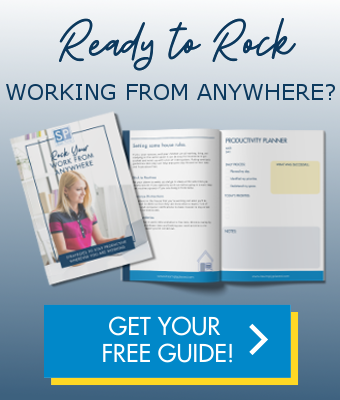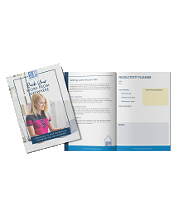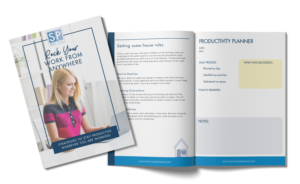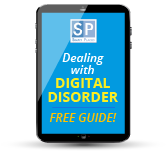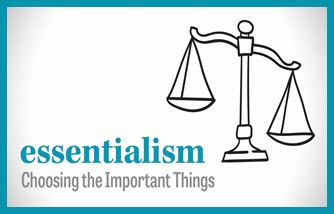
Let’s face it, most people are constantly tempted take on more than they can really handle. Understandably it is hard to let opportunities go. Each proposal, invitation and request feels special, and might seem to hold the promise of bringing more pleasure, reward or importance than we feel we have without it. It can be particularly difficult to say no to requests from employers and clients, even when we know we are already stretched too thin and can’t manage them all.
If we lose sight of what is essential for our goals and well-being, we might enter the magical thinking realm, thinking we will find some way to squeeze the new demand into our already too busy schedule…neglecting the fact that saying yes to too many non-essential projects, commitments and tasks creates a mess of stress that takes an increasingly detrimental toll on our job performance, relationships and health.
The Trivial Many and the Vital Few
In his book Essentialism – The Disciplined Pursuit of Less, author Greg McKeown emphasizes the importance of constantly assessing and remaining focused on what is most important. “There are far more activities and opportunities in the world than we have time and resources to invest in,” McKeown says. “And although many of them may be good, or even very good, the fact is that most are trivial and few are vital.”
Essentialism is a lifestyle based on discerning the difference between the “many trivial” and the “vital few.” Essentialists commit themselves to the vital few in every circumstance they can. The benefits of focusing on the vital few essential things instead of the trivial many include lower stress, the satisfaction of developing true excellence, and making a vital contribution in work and life.
I just finished reading McKeown’s book, and though many of the concepts are not new, I found his descriptions and recommendations to be very well written and inspiring. I especially enjoyed the examples he gave from the lives of many successful leaders and ordinary people who have improved their success and happiness by practicing Essentialist principles. Below are some key points from the book that help me apply the Essentialist approach, and would help anyone improve productivity and well-being whether an aspiring Essentialist or not.
6 Principles Every Essentialist Understands
- The power of choice. When we don’t realize or we forget that we have the power of choice, we let others determine what fills our time. Essentialists are empowered by choice to decide for themselves what they do and don’t do with their time.
- The value of extreme criteria. Essentialists don’t consider just the minimum requirements for saying yes. They use “extreme” criteria, asking themselves questions to evaluate every possibility, such as “Is this activity exactly what I want to do with my time? Is this opportunity an ideal fit for me? Will this project best leverage my talents and goals? Will this commitment support my values and calling?” McKeown recommends, “If it isn’t a clear yes, then it’s a clear no.”
- The reality of trade-offs. To do one thing is to let go of something else, probably even other essential things. The more we commit to doing, the less room in our lives for other important things – including family, relationships, rest, exercise, faith and play. Essentialists systematically weigh every opportunity against the trade-offs to make sure they choose the right things to focus on and have enough time for them all.
- The liberating power ofNo. By saying no to the many trivial requests, Essentialists wisely say yes to what matters most in their lives: their vision and goals, work, family, health and deepest callings.
- The momentum of focus. For every ten things Nonessentialists do, Essentialists do one. Instead of diffusing their energy distracting themselves with many unimportant things, they focus it on the vital few, and by doing so gain momentum to make a stronger impact, increasing performance and success. If you feel “spread too thin”, this is a sign it is time to let go of some commitments, relieve yourself of some tasks and harness your focus.
- The importance of clarity. Essentialists say no to 90% of the opportunities that come their way. If we are very clear on what we should do and why, we can more easily filter out the hundreds of things we shouldn’t waste our time and energy on. To gain this clarity requires constantly asking ourselves difficult questions, making trade-offs, and exercising self-discipline. Essentialists know it is absolutely worth investing in the 10% of opportunities that make sense for them.
To be satisfied, fulfilled and successful, according to McKeown, we need to save our energy and creativity for just a few essential opportunities and pass on all the rest. That requires making difficult choices, but we are fooling ourselves to think that taking on a multitude of non-essential activities and commitments will enrich our lives. In the end we will just end up doing a lot of things halfway instead of a few things well.
If you are feeling challenged by quantity over quality – whether that is with your stuff, paper, email, projects, tasks or unmade decisions, we can help you move from over committed and overwhelmed to focused and fulfilled. We help people identify what is essential, clarify their goals, focus on their priorities, and create more time and space for what matters most in their lives. Schedule your free, no-risk Discovery Call to learn more.

